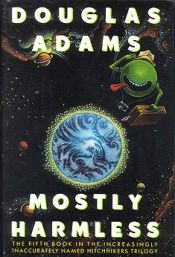Five Weeks in a Balloon
by Jules Verne
I've always enjoyed the Jules Verne favorites (Round the World in 80 days, Journey to the Centre of the Earth, and 20,000 Leagues under the Sea), but it's harder to find JV's other works, despite the fact that he's written over 50 books, so I snatched this one up when I saw it.
It's the story of 3 men crossing Africa (then not fully explored at the time) in a balloon (a novel method at the time). So it's basically fiction since no man had crossed that part of Africa and no one had succeed in taking a long trip in a balloon. As a result you have to take his geography and even his science in stride. It has been worked out by others that his balloon could never have made the trip and we now know that his description of that part of Africa was fanciful. So it's fiction, nevertheless it's good fiction. And we have to remember that this book was written over 100 years ago! So when I read this book, it is also an exercise in time travel for me, to read this book as it was written, in 1869, otherwise you will be offended at all the non-politically correct events that happen and the descriptions of the natives and the mind set at that time.
It's interesting to note that this book was supposed to be a forerunner to the much beloved Round the World in 80 days and I can imagine Mr. Verne testing out his ideas in this book. Jules Verne was the father of the explorer/adventure type novel and today's authors owe a lot to him. So sit back and travel back 100+ years and try this book!

















